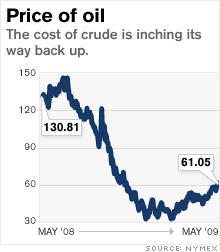Oil hits 6-month high
Crude sails above $66 on stronger Japanese industrial production and slowing U.S. economic contraction.

LONDON (Reuters) -- Oil settled at a six-month high above $66 per barrel Friday, for its largest monthly percentage gain in more than a decade, after U.S., Japanese and Indian data suggested the economic downturn may be easing.
Oil prices have jumped around 30% this month, the largest monthly rise since March 1999, buoyed by expectations of a global economic recovery later this year, which helped push stock markets higher.
U.S. crude oil for July delivery settled up $1.23 at $66.31 per barrel, after reaching $66.47. The settlement was the highest since it closed at $70.53 on Nov. 4.
The dollar hit a five-month low against a basket of other currencies. A weak dollar makes oil cheaper for holders of other currencies and tends to support prices.
Data Friday showed Japanese industrial production rose 5.2% in April on a monthly basis, and the government said it expected continued gains through June.
U.S. growth data Friday also reinforced the sense that the global economic slump might be abating.
The Commerce Department said the world's largest economy contracted slightly less than initially estimated in the first quarter, dropping at a 5.7% annual rate, rather than the 6.1% fall published by the government last month.
The revision was nevertheless below market expectations for a 5.5% contraction for the January-March quarter.
India's economy grew faster than expected in the first quarter, helped by strength in farm and services sectors.
"Oil market participants' conclusion that the worst of the recession has passed and a recovery in demand must be at hand was bolstered overnight by higher-than-expected first-quarter growth in India and a sharp jump in Japan's April industrial production," said Mike Fitzpatrick, vice president at MF Global in New York.
Another supportive influence was Thursday's report by the U.S. Energy Information Administration on U.S. crude oil stocks, which fell 5.4 million barrels in the week to May 22, way above analysts' expectations in a Reuters poll for a 700,000 barrel decline.
Gasoline inventories also fell for the fifth week in a row as demand rose in the week preceding the Memorial Day holiday, which traditionally marks the start of the summer driving season in the United States.
"The market has reacted to the headline figures," said Harry Tchilinguirian, analyst at BNP Paribas in London. "That has helped extend technical buying as we moved above the psychologically important 200-day moving average (MA)."
The front month for U.S. crude oil futures crossed up through its 200-day MA on its daily price chart Tuesday and it is now acting as a strong support, according to technical analysts who track prices on charts.
OPEC's decision to hold oil production steady also helped prop up prices. The producer group Thursday kept its output targets unchanged as expected, betting on a strengthening world economy and tentative signs of increased demand.
Analysts said Saudi Arabia's statement this week that the global economy could now cope with $75 to $80 a barrel oil was a shift from the world's largest oil producer, which has until recently hinted it would be happy with a lower price to help the world economy back on its feet. ![]()

